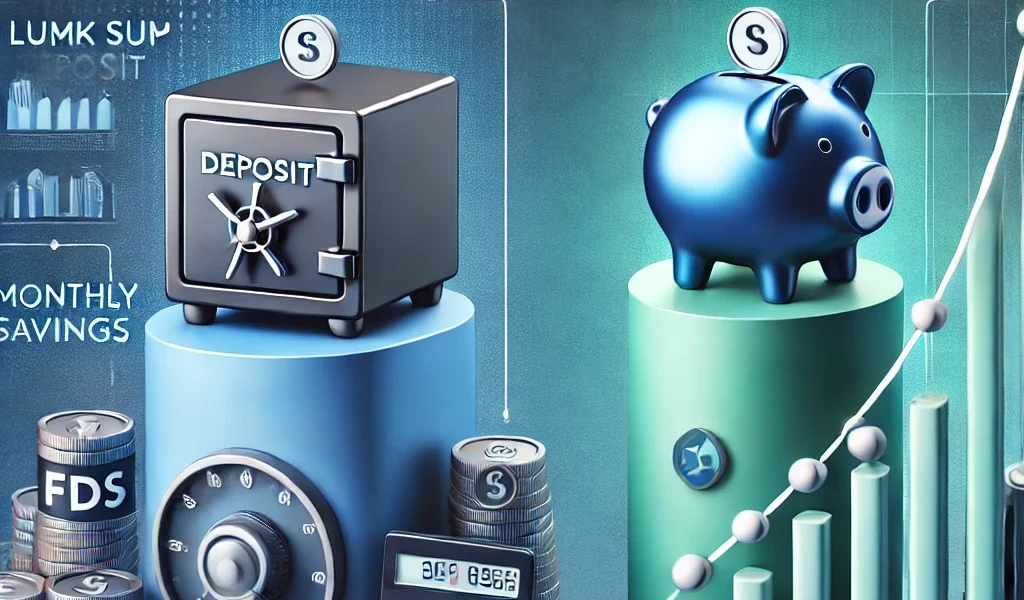When it comes to safe and stable investment options, Fixed Deposits (FDs) and Recurring Deposits (RDs) are two of the most popular choices among investors. Both offer assured returns, minimal risk, and are ideal for individuals who prefer a disciplined approach to savings. However, choosing between the two depends on your financial goals, liquidity needs, and investment horizon.
In this detailed comparison, we will break down the key differences between FDs and RDs, their benefits, drawbacks, and which one suits your needs best.
What is a Fixed Deposit (FD)?
A Fixed Deposit is a lump sum investment where you deposit a fixed amount with a bank or financial institution for a predetermined period at a fixed interest rate. The interest is compounded periodically, and at maturity, you receive the principal along with accumulated interest.
Features of Fixed Deposits:
- One-time lump sum investment.
- Fixed tenure ranging from 7 days to 10 years.
- Higher interest rates than regular savings accounts.
- Premature withdrawal is possible but with a penalty.
- Suitable for long-term wealth accumulation.
What is a Recurring Deposit (RD)?
A Recurring Deposit allows investors to deposit a fixed amount every month for a specified period. The interest is earned on the deposited amount and compounded quarterly or monthly, depending on the bank.
Features of Recurring Deposits:
- Monthly investments of a fixed sum.
- Tenure options generally range from 6 months to 10 years.
- Interest rates are similar to FDs.
- Premature withdrawal is allowed with a penalty.
- Ideal for individuals who want to cultivate a saving habit.
Key Differences Between Fixed Deposits and Recurring Deposits
| Feature | Fixed Deposit (FD) | Recurring Deposit (RD) |
|---|---|---|
| Investment Type | One-time lump sum investment | Monthly investments |
| Tenure | 7 days to 10 years | 6 months to 10 years |
| Interest Rate | Slightly higher than RD | Slightly lower than FD |
| Interest Calculation | Compounded periodically on the entire amount | Compounded on deposited amounts monthly |
| Liquidity | Lower liquidity due to one-time deposit | More flexible due to smaller, regular deposits |
| Premature Withdrawal | Allowed with penalty | Allowed with penalty |
| Best For | Investors with surplus funds | Regular savers with stable income |
Pros and Cons of Fixed Deposits (FDs)
Pros:
✅ Higher interest rates compared to RDs and savings accounts. ✅ One-time investment with no ongoing commitments. ✅ Can be used as collateral for loans. ✅ Offers flexibility in choosing tenure.
Cons:
❌ Requires a lump sum amount, which may not be feasible for everyone. ❌ Less flexible for those who want to save gradually. ❌ Premature withdrawals attract penalties.
Pros and Cons of Recurring Deposits (RDs)
Pros:
✅ Encourages disciplined savings with monthly deposits. ✅ Suitable for individuals with a steady income. ✅ Offers similar security and returns as FDs. ✅ Lower investment requirement compared to FDs.
Cons:
❌ Overall returns may be lower than FDs. ❌ Requires commitment to deposit regularly. ❌ Premature withdrawal leads to lower interest earnings.
FD vs. RD: Which One Should You Choose?
Choose FD if:
- You have a lump sum amount to invest.
- You want higher returns with low risk.
- You are looking for a long-term investment option.
- You don’t need regular access to your funds.
Choose RD if:
- You prefer to invest smaller amounts regularly.
- You want to develop a disciplined saving habit.
- You have a stable monthly income.
- You need flexibility in liquidity over time.
Taxation on FDs and RDs
Both FDs and RDs attract tax on the interest earned:
- Interest from FDs and RDs is taxable as per your income tax slab.
- TDS (Tax Deducted at Source) is applicable if interest exceeds Rs. 40,000 per year (Rs. 50,000 for senior citizens).
- If your income is below the taxable limit, you can submit Form 15G/15H to avoid TDS.
Which One Should You Invest In?
The choice between Fixed Deposits and Recurring Deposits depends on your financial goals and liquidity needs:
- If you have a lump sum amount and want to earn higher interest with stability, go for Fixed Deposits (FDs).
- If you prefer small, regular investments over time, Recurring Deposits (RDs) are a better choice.
- If you are saving for a short-term goal (like a vacation, education, or emergency fund), RDs can help you save gradually.
- If you want to park idle money for higher returns than a savings account, FDs are a great option.
Final Thoughts
Both Fixed Deposits and Recurring Deposits are safe and secure investment options for risk-averse investors. If you have a lump sum amount and want to earn higher interest, a Fixed Deposit is ideal. On the other hand, if you want to develop a disciplined saving habit and invest small amounts over time, a Recurring Deposit is the better choice.
Before investing, assess your financial goals, liquidity needs, and income stability. Always compare interest rates, check premature withdrawal penalties, and consider tax implications to make an informed decision.
Disclaimer:
This article is for informational purposes only and does not constitute financial advice. Please consult with a financial expert before making any investment decisions.




